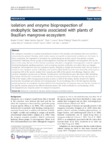Please use this identifier to cite or link to this item:
http://www.alice.cnptia.embrapa.br/alice/handle/doc/1003307| Title: | Isolation and enzyme bioprospection of endophytic bacteria associated with plants of Brazilian mangrove ecosystem. |
| Authors: | CASTRO, R. A.  QUECINE, M. C.   LACAVA, P. T.   BATISTA, B. D.   LUVIZOTTO, D. M.   MARCON, J.   FERREIRA, A.   MELO, I. S. de   AZEVEDO, J. L.   |
| Affiliation: | RENATA ASSIS CASTRO, CENA-USP; MARIA CAROLINA QUECINE, ESALQ-USP; PAULO TEIXEIRA LACAVA, ESALQ-USP; BNRUNA D BATISTA, ESALQ-USP; DANICE MAZZER LUVIZOTTO, ESALQ-USP; JOELMA MARCON, ESALQ-USP; ANDERSON FERREIRA, CPAMT; ITAMAR SOARES DE MELO, CNPMA; JOAO LUCIO DE AZEVEDO, ESALQ-USP. |
| Date Issued: | 2014 |
| Citation: | SpringerPlus, Amsterdam, v. 3, n. 382, p. 1-9, 2014. |
| Description: | Abstract: The mangrove ecosystem is a coastal tropical biome located in the transition zone between land and sea that is characterized by periodic flooding, which confers unique and specific environmental conditions on this biome. In these ecosystems, the vegetation is dominated by a particular group of plant species that provide a unique environment harboring diverse groups of microorganisms, including the endophytic microorganisms that are the focus of this study. Because of their intimate association with plants, endophytic microorganisms could be explored for biotechnologically significant products, such as enzymes, proteins, antibiotics and others. Here, we isolated endophytic microorganisms from two mangrove species, Rhizophora mangle and Avicennia nitida, that are found in streams in two mangrove systems in Bertioga and Cananéia, Brazil. Bacillus was the most frequently isolated genus, comprising 42% of the species isolated from Cananéia and 28% of the species from Bertioga. However, other common endophytic genera such as Pantoea, Curtobacterium and Enterobacter were also found. After identifying the isolates, the bacterial communities were evaluated for enzyme production. Protease activity was observed in 75% of the isolates, while endoglucanase activity occurred in 62% of the isolates. Bacillus showed the highest activity rates for amylase and esterase and endoglucanase. To our knowledge, this is the first reported diversity analysis performed on endophytic bacteria obtained from the branches of mangrove trees and the first overview of the specific enzymes produced by different bacterial genera. This work contributes to our knowledge of the microorganisms and enzymes present in mangrove ecosystems. |
| Thesagro: | Bactéria Enzima Mangue |
| NAL Thesaurus: | Mangrove forests endophytes enzymes |
| Keywords: | Mangrove Biotechnological potential |
| ISSN: | 2193-1801 |
| Type of Material: | Artigo de periódico |
| Access: | openAccess |
| Appears in Collections: | Artigo em periódico indexado (CPAMT)  |
Files in This Item:
| File | Description | Size | Format | |
|---|---|---|---|---|
| cpamt2014ferreirabioprospectionendophytic.pdf | 208,37 kB | Adobe PDF |  View/Open |









